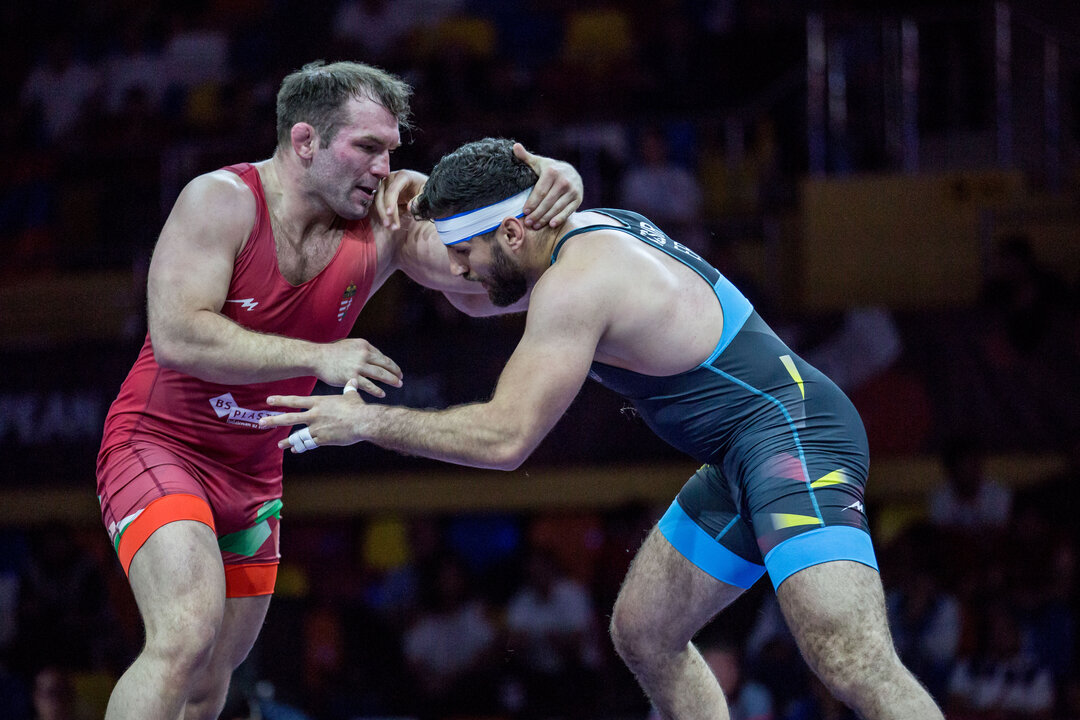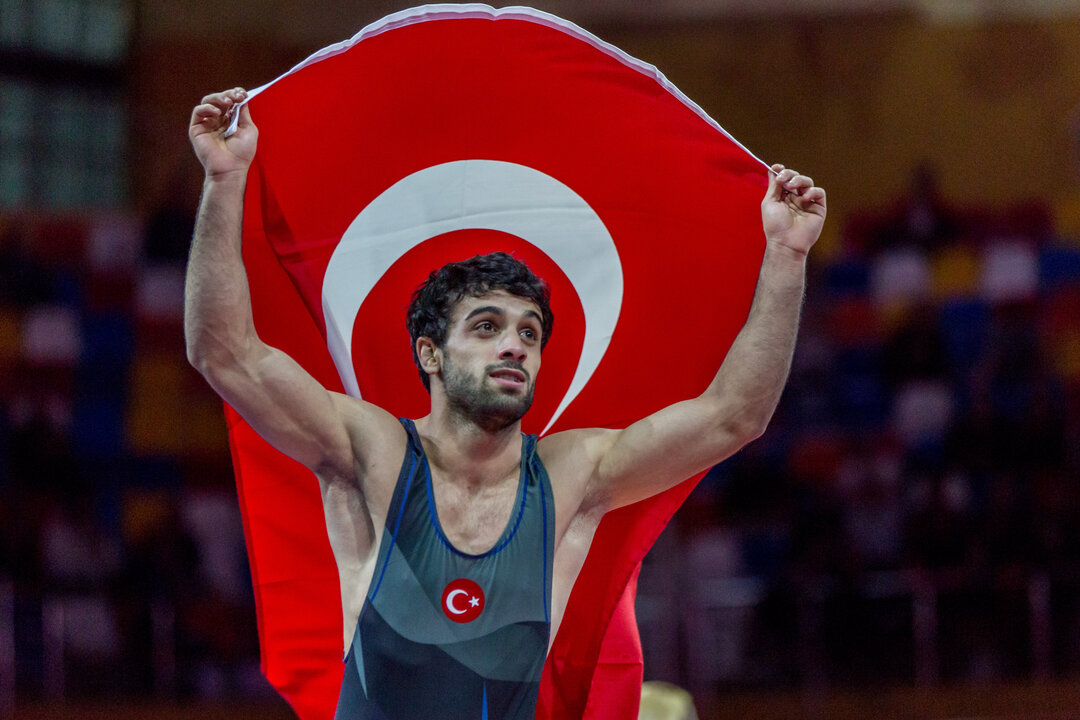Kazakhstan, Hungary Have Pair of New No.1's in World Greco-Roman Rankings
Tuesday, July 3, 2018 - 04:57 By United World Wrestling Press

CORSIER-SUR-VEVEY (July 3) -- The July 2018 Ranking Series for Greco-Roman has some faces at the top of the rankings. Kazakhstan and Hungary have two new No.1-ranked wrestlers.
Kazakhstan wrestlers Almat KEBISPAYEV (67kg) and Khussein MUTSOLGOV (87kg) earned No.1 rankings. Kebispayev has had a very strong year, winning gold medals at the Takhti Cup and Asian Championships, and most recently a bronze at the Grand Prix of Hungary. Mutsolgov, a silver medalist at the Asian Championships, recently placed fifth at the Grand Prix of Hungary.
Hungarian upperweights Balazs KISS and Lam BALINT climb to No.1 at 97kg and 130kg respectively. They join fellow Hungarian Balint KORPASI (72kg) atop the rankings.
 df. Ramsin AZIZSIR (GER) -by VPO1, 4 - 1.jpg)
Kiss, a returning world bronze medalist, recently captured a gold medal at the Grand Prix of Hungary after picking up a bronze at the European Championships in late April. Balint is coming off a bronze-medal performance at the Grand Prix of Hungary. He also won medals this year at the World Military Championships and Cerro Pelado International. Korpasi, a 2016 world champion, is coming off a gold-medal performance at the Grand Prix of Hungary.
Kyrgyzstan wrestlers K. ZHOLCHUBEKOV (60kg) and U. AMATOV (63kg) remain No.1. Zholchubekov won a gold medal at the Grand Prix of Hungary after winning a bronze at the Asian Championships and gold at the Takhti Cup. Amatov has earned medals at the Takhti Cup (bronze), Asian Championships (silver) and Grand Prix of Hungary (bronze).
Mohammadali GERAEI (IRI) holds his No.1 ranking at 77kg after adding a silver medal at the Grand Prix of Hungary to go along with a silver at the Asian Championships and a gold at the Takhti Cup.
 df. Nedyalko Petrov PETROV (BUL) -by VSU1, 12 - 4-2.jpg)
Other No.1-ranked wrestlers include Ekrem OZTURK (TUR) at 55kg and Daniel ALEKSANDROV (BUL) at 82kg.
For more on the Ranking Series format, be sure to check out this article.
View all the rankings on United World Wrestling's homepage.
55kg
1. Ekrem OZTURK (TUR) // 30 Points
2. Khorlan ZHAKANSHA (KAZ) // 30 Points
3. Abdelkarim FERGAT (ALG) // 27 Points
4. Reza KHEDRI (IRI) // 24 Points
5. Liguo CAO (CHN) // 24 Points
60kg
1. K. ZHOLCHUBEKOV (KGZ) // 50 Points
2. Luis Alberto ORTA SANCHEZ (CUB) // 35 Points
3. Sergey EMELIN (RUS) // 27 Points
4. Murad MAMMADOV (AZE) // 25 Points
5. Shinobu OTA (JPN) // 23 Points
63kg
1. U. AMATOV (KGZ) // 41 Points
2. Hassan Hassan Ahmed MOHAMED (EGY) // 29 Points
3. Mihai Radu MIHUT (ROU) // 28 Points
4. Stig-Andre BERGE (NOR) // 26 Points
5. Zaur KABALOEV (RUS) // 24 Points
67kg
1. Almat KEBISPAYEV (KAZ) // 52 Points
2. Ismael BORRERO (CUB) // 47 Points
3. Artem SURKOV (RUS) // 32 Points
4. Shmagi BOLKVADZE (GEO) // 30 Points
5. Karen ASLANYAN (ARM) // 28 Points
72kg
1. Balint KORPASI (HUN) // 57 Points
2. Demeu ZHADRAYEV (KAZ) // 49 Points
3. Adam KURAK (RUS) // 33 Points
4. Rasul CHUNAYEV (AZE) // 31 Points
5. Iuri LOMADZE (GEO) // 29 Points
77kg
1. Mohammadali GERAEI (IRI) // 38 Points
2. Ariel FIS BATISTA (CUB) // 34 Points
3. Roman VLASOV (RUS) // 34 Points
4. Viktor NEMES (SRB) // 32 Points
5. Tamas LORINCZ (HUN) // 30 Points
82kg
1. Daniel ALEKSANDROV (BUL) // 40 Points
2. Laszlo SZABO (HUN) // 31 Points
3. Atabek AZISBEKOV (KGZ) // 30 Points
4. Zarko DICKOV (SRB) // 29 Points
5. Maksim MANUKYAN (ARM) // 29 Points
87kg
1. Khussein MUTSOLGOV (KAZ) // 37 Points
2. Roberti KOBLIASHVILI (GEO) // 33 Points
3. Bekkhan OZDOEV (RUS) // 31 Points
4. Daniel GREGORICH HECHAVARRIA (CUB) // 29 Points
5. Kristoffer Zakarias BERG (SWE) // 29 Points
97kg
1. Balazs KISS (HUN) // 44 Points
2. Orkhan NURIYEV (AZE) // 42 Points
3. Cenk ILDEM (TUR) // 38 Points
4. Luillys Jose PEREZ MORA (VEN) // 34 Points
5. Artur ALEKSANYAN (ARM) // 33 Points
130kg
1. Lam BALINT (HUN) // 42 Points
2. Ciurariu alin ALEXUC (ROU) // 40 Points
3. Oscar PINO HINDS (CUB) // 36 Points
4. Behnam mahdizadeh ARPATAPEH (IRI) // 34 Points
5. Riza KAYAALP (TUR) // 27 Points


 Women's Wrestling at the 2004 Athens Olympic Games. (Photo: United World Wrestling / Martin Gabor)
Women's Wrestling at the 2004 Athens Olympic Games. (Photo: United World Wrestling / Martin Gabor) Tayla FORD (NZL) is the first wrestler from New Zealand who will compete at the Olympics. (Photo: United World Wrestling / Amirreza Aliasgari)
Tayla FORD (NZL) is the first wrestler from New Zealand who will compete at the Olympics. (Photo: United World Wrestling / Amirreza Aliasgari)
Share your thoughts.
Comments